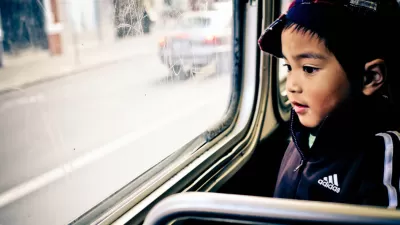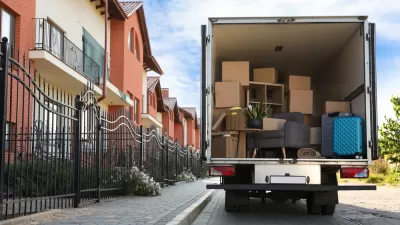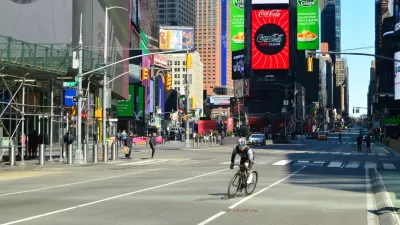A recent study that connected place to opportunity also includes findings about the factor most likely to influence economic success: access to transportation.

Mikayla Bouchard follows up on recent coverage of a Harvard study by focusing on the study's findings that one factor in particular determines whether people can build a better life: "A lack of reliable and efficient transportation is often a huge barrier." Bouchard puts it another way: "The longer an average commute in a given county, the worse the chances of low-income families there moving up the ladder."
In fact, the study finds that transportation is more influential than other factors that many would assume have the most impact on economic mobility: "The relationship between transportation and social mobility is stronger than that between mobility and several other factors, like crime, elementary-school test scores or the percentage of two-parent families in a community…"
To supplement the article's point, Bouchard also cites research from New York University’s Rudin Center for Transportation, which "compared neighborhoods by accessibility to mass transit and the number of jobs within an hour’s commute. It found that residents of the areas least well served by mass transit relied on personal vehicles. Areas in the middle third — those with some, but insufficient, access to transportation — had the highest rates of unemployment and the lowest incomes, the study found."
FULL STORY: Transportation Emerges as Crucial to Escaping Poverty

Alabama: Trump Terminates Settlements for Black Communities Harmed By Raw Sewage
Trump deemed the landmark civil rights agreement “illegal DEI and environmental justice policy.”

Planetizen Federal Action Tracker
A weekly monitor of how Trump’s orders and actions are impacting planners and planning in America.

The 120 Year Old Tiny Home Villages That Sheltered San Francisco’s Earthquake Refugees
More than a century ago, San Francisco mobilized to house thousands of residents displaced by the 1906 earthquake. Could their strategy offer a model for the present?

In Both Crashes and Crime, Public Transportation is Far Safer than Driving
Contrary to popular assumptions, public transportation has far lower crash and crime rates than automobile travel. For safer communities, improve and encourage transit travel.

Report: Zoning Reforms Should Complement Nashville’s Ambitious Transit Plan
Without reform, restrictive zoning codes will limit the impact of the city’s planned transit expansion and could exclude some of the residents who depend on transit the most.

Judge Orders Release of Frozen IRA, IIJA Funding
The decision is a victory for environmental groups who charged that freezing funds for critical infrastructure and disaster response programs caused “real and irreparable harm” to communities.
Urban Design for Planners 1: Software Tools
This six-course series explores essential urban design concepts using open source software and equips planners with the tools they need to participate fully in the urban design process.
Planning for Universal Design
Learn the tools for implementing Universal Design in planning regulations.
Clanton & Associates, Inc.
Jessamine County Fiscal Court
Institute for Housing and Urban Development Studies (IHS)
City of Grandview
Harvard GSD Executive Education
Toledo-Lucas County Plan Commissions
Salt Lake City
NYU Wagner Graduate School of Public Service




























